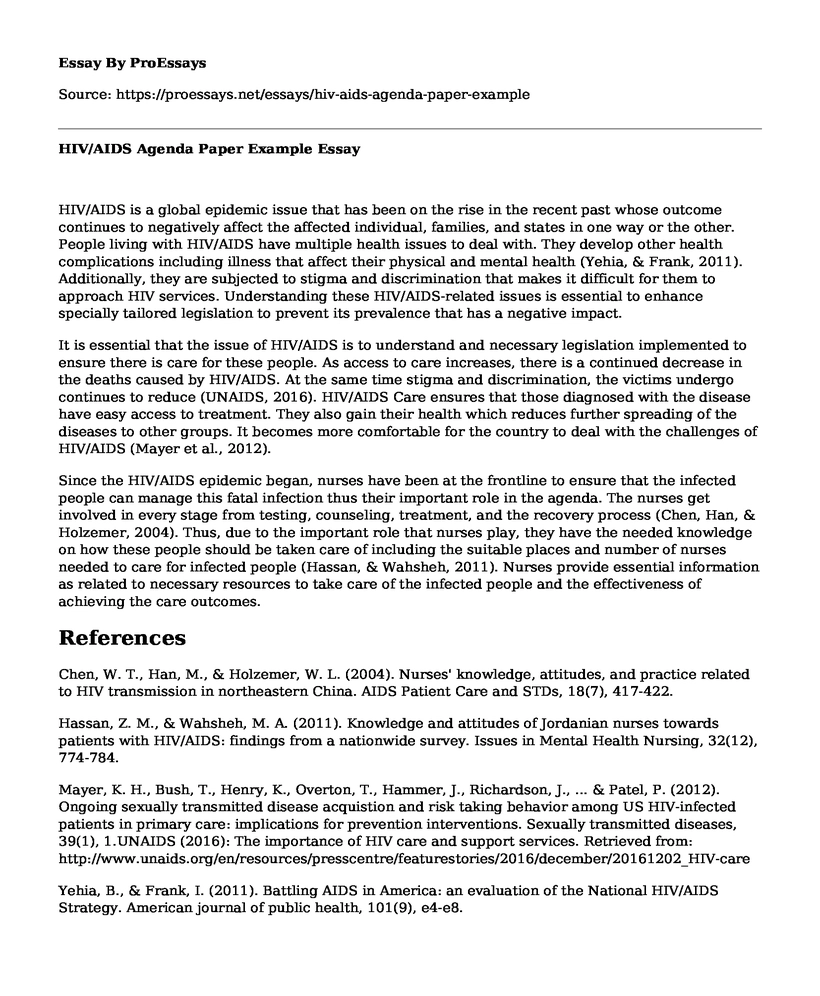HIV/AIDS is a global epidemic issue that has been on the rise in the recent past whose outcome continues to negatively affect the affected individual, families, and states in one way or the other. People living with HIV/AIDS have multiple health issues to deal with. They develop other health complications including illness that affect their physical and mental health (Yehia, & Frank, 2011). Additionally, they are subjected to stigma and discrimination that makes it difficult for them to approach HIV services. Understanding these HIV/AIDS-related issues is essential to enhance specially tailored legislation to prevent its prevalence that has a negative impact.
It is essential that the issue of HIV/AIDS is to understand and necessary legislation implemented to ensure there is care for these people. As access to care increases, there is a continued decrease in the deaths caused by HIV/AIDS. At the same time stigma and discrimination, the victims undergo continues to reduce (UNAIDS, 2016). HIV/AIDS Care ensures that those diagnosed with the disease have easy access to treatment. They also gain their health which reduces further spreading of the diseases to other groups. It becomes more comfortable for the country to deal with the challenges of HIV/AIDS (Mayer et al., 2012).
Since the HIV/AIDS epidemic began, nurses have been at the frontline to ensure that the infected people can manage this fatal infection thus their important role in the agenda. The nurses get involved in every stage from testing, counseling, treatment, and the recovery process (Chen, Han, & Holzemer, 2004). Thus, due to the important role that nurses play, they have the needed knowledge on how these people should be taken care of including the suitable places and number of nurses needed to care for infected people (Hassan, & Wahsheh, 2011). Nurses provide essential information as related to necessary resources to take care of the infected people and the effectiveness of achieving the care outcomes.
References
Chen, W. T., Han, M., & Holzemer, W. L. (2004). Nurses' knowledge, attitudes, and practice related to HIV transmission in northeastern China. AIDS Patient Care and STDs, 18(7), 417-422.
Hassan, Z. M., & Wahsheh, M. A. (2011). Knowledge and attitudes of Jordanian nurses towards patients with HIV/AIDS: findings from a nationwide survey. Issues in Mental Health Nursing, 32(12), 774-784.
Mayer, K. H., Bush, T., Henry, K., Overton, T., Hammer, J., Richardson, J., ... & Patel, P. (2012). Ongoing sexually transmitted disease acquistion and risk taking behavior among US HIV-infected patients in primary care: implications for prevention interventions. Sexually transmitted diseases, 39(1), 1.UNAIDS (2016): The importance of HIV care and support services. Retrieved from: http://www.unaids.org/en/resources/presscentre/featurestories/2016/december/20161202_HIV-care
Yehia, B., & Frank, I. (2011). Battling AIDS in America: an evaluation of the National HIV/AIDS Strategy. American journal of public health, 101(9), e4-e8.
Cite this page
HIV/AIDS Agenda Paper Example. (2022, Dec 12). Retrieved from https://proessays.net/essays/hiv-aids-agenda-paper-example
If you are the original author of this essay and no longer wish to have it published on the ProEssays website, please click below to request its removal:
- Essay Example on Pathophysiology: Obesity
- Standardized Screening Tools for a 30 Months Old Child - Paper Example
- Essay Sample on Genetic Tests for Cancer Risk Genes
- Research Paper on HIV Issue in India
- Paper Example on Wrong Medication: The Risk of Confusion for Medical Practitioners
- Article Analysis Essay on "On the Moral and Legal Status of Abortion"
- Research Paper on Lloyd George & Young Wilston: Pioneers of Welfare & Healthcare Reforms







